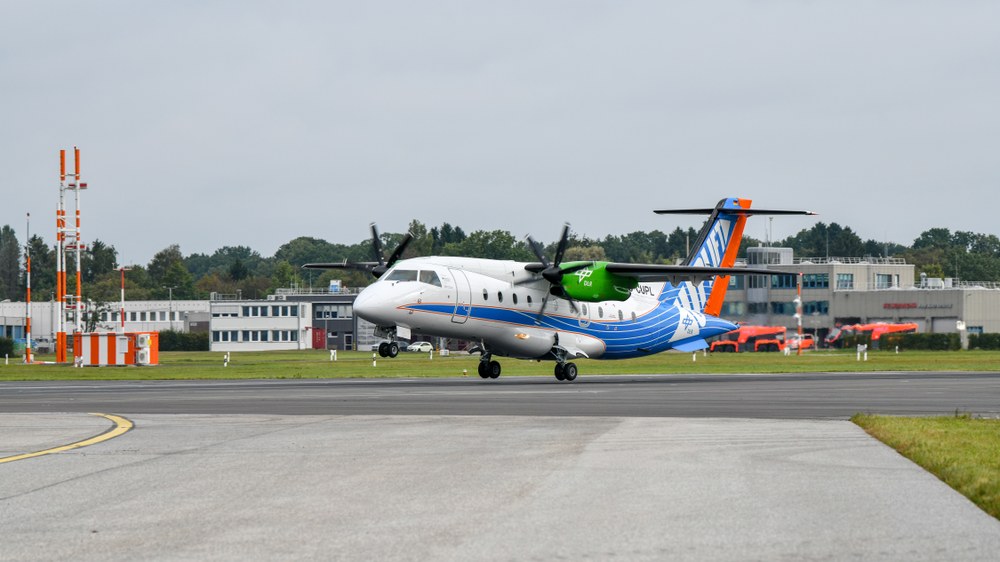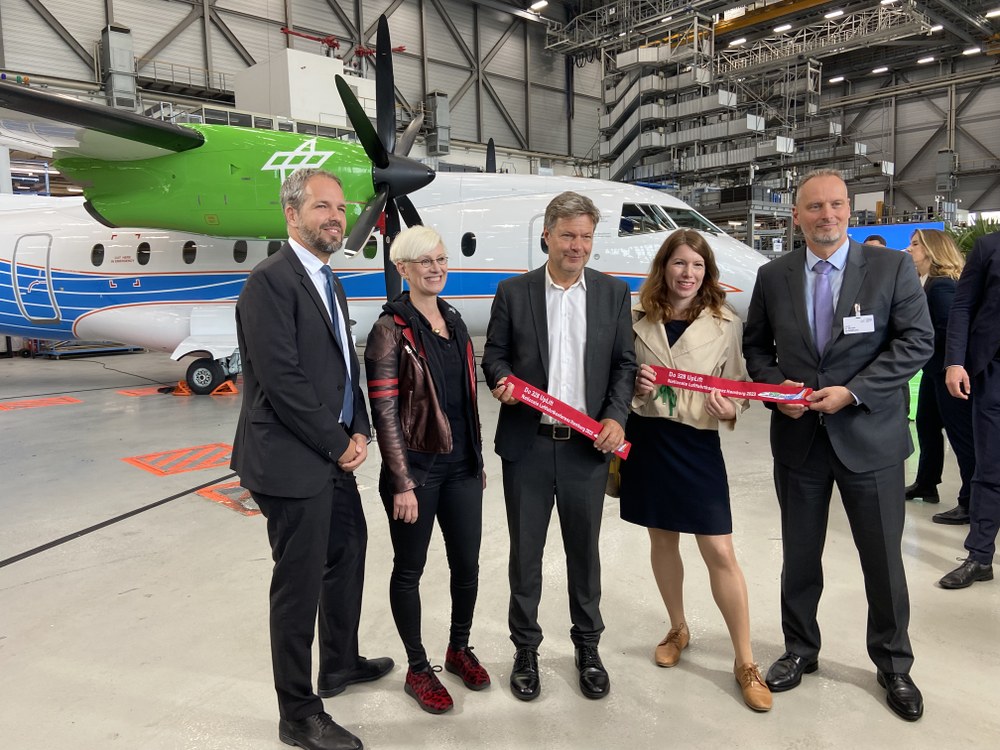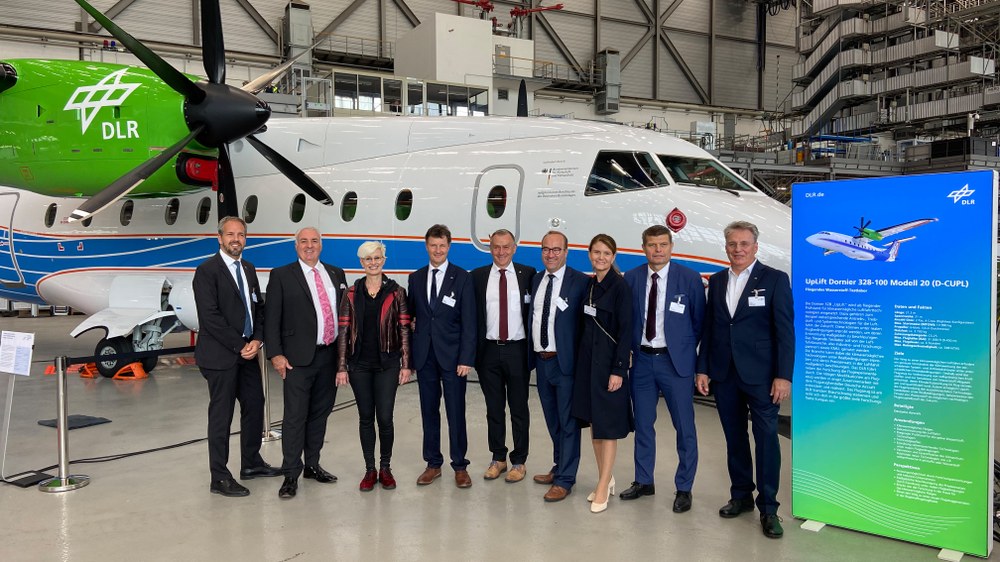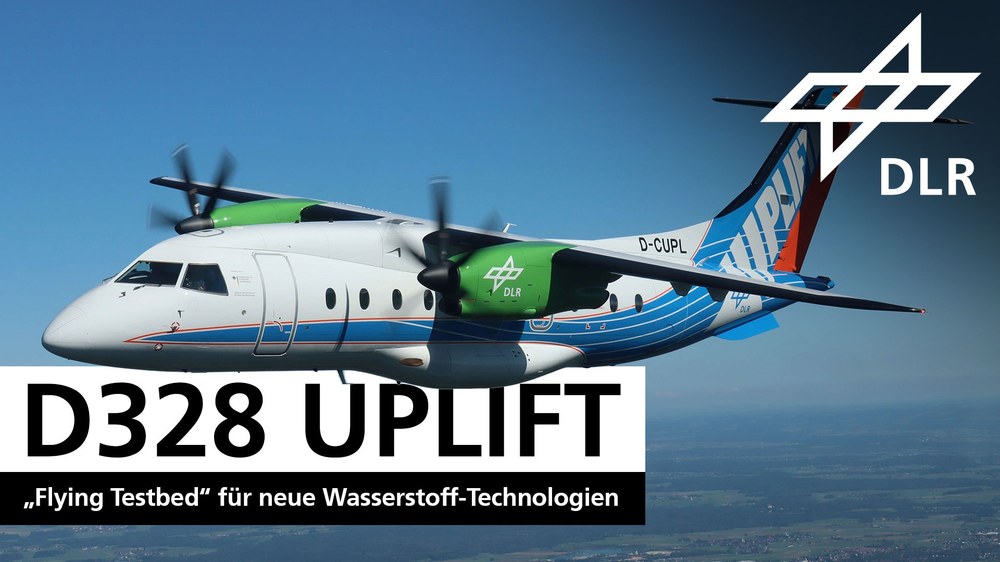DLR acquires flying hydrogen laboratory and demonstrates whole-system solutions



- A Dornier 328-100 Model 20 has joined the DLR research fleet as part of the UpLift project; it will be a 'flying testbed' for disruptive hydrogen technologies.
- Testing of promising propulsion, fuel and system technologies for the decarbonisation of air transport under real flight conditions is planned.
- The research aircraft will be made available to as many interested industrial and research partners as possible, with an open technology policy.
- Focus: Aeronautics, climate-friendly flight
On 25 September 2023, the German Aerospace Center (Deutsches Zentrum für Luft- und Raumfahrt; DLR) took delivery of the new D328 UpLift research aircraft during the National Aviation Conference and in the presence of the Federal Minister for Economic Affairs and Climate Action, Robert Habeck. Deutsche Aircraft handed over the 'flying testbed' to DLR in Hamburg. The procurement, conversion and use of the aircraft for research into hydrogen technologies in air transport is part of the UpLift project, funded by the German Federal Ministry for Economic Affairs and Climate Action (Bundesministerium für Wirtschaft und Klimaschutz; BMWK). The flying testbed will translate research into practical applications on the way to climate-friendly air transport and points the way towards a new generation of aircraft in the regional class.
"It is our responsibility to do everything in our power to ensure the availability of global mobility in the future, and to do so in harmony with the environment. Air transport makes a decisive contribution to economic growth and thus to the prosperity of society," emphasised Anke Kaysser-Pyzalla, Chair of the DLR Executive Board, on the occasion of the National Aviation Conference in Hamburg. "All processes relating to the climate impact of air transport must be considered in a global context. Therefore, research and science, industry and governments, not just in Germany, have a responsibility to do their part in reducing global carbon dioxide emissions and non-carbon-dioxide effects. And that requires us to implement all available technologies without compromise as a joint effort."
The new UpLift flying test laboratory, a Dornier 328-100 Model 20 with the registration D-CUPL, will be part of the DLR research fleet and will be stationed at the Braunschweig site. With its modular design, it will be open to as many interested partners as possible – particularly SMEs and start-ups without their own flight test facilities. In this way, promising propulsion, fuel and system technologies for the decarbonisation of air transport can be tested quickly and under real flight conditions in order to significantly accelerate their development.

Video: D328 UpLift – 'Flying Testbed' for new hydrogen technologies
Your consent to the storage of data ('cookies') is required for the playback of this video on Youtube.com. You can view and change your current data storage settings at any time under privacy.
"The BDLI welcomes today's handover of the 'flying testbed', which will make a significant contribution to the implementation of the goal of climate-neutral flight. Now it is important to continue on the path we have chosen. With the H2 test laboratory, Germany is taking on a leading role in aeronautics research with a role model function for future demonstration projects, which must then also include airframes in the area of structure, aerodynamics as well as systems technology," said Alexander Reinhardt, Managing Director of the German Aerospace Industries Association (Bundesverband der Deutschen Luft- und Raumfahrtindustrie; BDLI).
Flight testing of promising candidate technologies
In addition to research, DLR will also carry out the flight experiments. The necessary modifications to the aircraft are being developed and implemented in close cooperation with the aircraft manufacturer. The path to climate-friendly air transport first requires a precise understanding of the climate impact of the various system and propulsion concepts under very different operating conditions. For this reason, the aircraft is primarily being equipped to burn fully synthetic fuels and to simulate hydrogen exhaust gases, whose climate impact will be measured and quantified in flight. Building on this, UpLift will enable flight testing of the most promising alternative technologies, such as the possible use of hydrogen as a sustainable aviation fuel, under real operating conditions. Thanks to the very rapid implementation of the project, the first research flights are expected to take place in the coming months.
"The Deutsche Aircraft team is very proud to be making their expertise available to the German government's 'LuFo Klima' research programme as a partner and holder of the type certification for the 328-100. Deutsche Aircraft is committed to the sustainable development of air transport. With the new D328 Uplift flying test laboratory, all innovators and industry partners from the sector now have a platform at their disposal to test and further develop new technologies and come closer to the goal of climate-neutral flights," said Nico Neumann, the Chief Operating Officer of Deutsche Aircraft GmbH.
DLR is acting as project leader for UpLift. Deutsche Aircraft is a project partner and is contributing its expertise as an aircraft manufacturer. The funding for the years 2023 to 2025 is part of the BMWK aeronautics research programme 'LuFo Klima', the central instrument with which the German government supports the aviation industry on its way towards carbon dioxide neutrality and climate compatibility.
ALICIA – whole-system solutions for climate-friendly air transport
In addition to the new D328 UpLift research aircraft, DLR is focusing on research for whole-system, climate-compatible solutions by presenting the Aviation Life Cycle and Impact Assessment (ALICIA) project at the National Aviation Conference. The ALICIA methodology draws on DLR aeronautics research for the digital assessment and consideration of significant factors relating to climate impact, energy demand and value creation across the entire lifecycle of an aircraft. ALICIA focuses on defining and establishing an approach for the whole-system assessment and potential evaluation of air transport by linking impact assessment and lifecycle assessment. This overall system capability represents a particular competence of DLR, through which, for example, the effects of revolutionary technologies, flight operations procedures and regulatory measures can be evaluated with regard to their influences on the performance and sustainability of the overall air transport system. To visualise the results and support the decision-making process, an interactive dashboard is being incrementally developed and refined. In this dashboard application, the complex interrelationships of the entire impact chain are presented in a comprehensible way and made interpretable for decision-makers.
Related article
